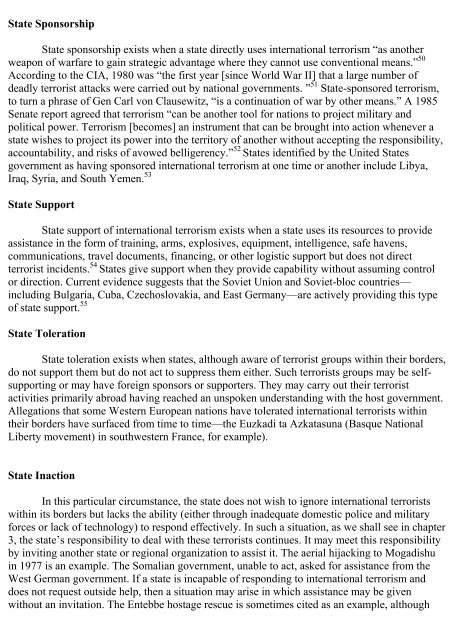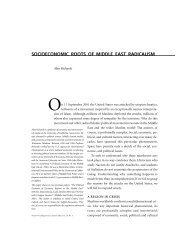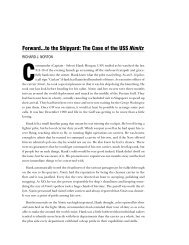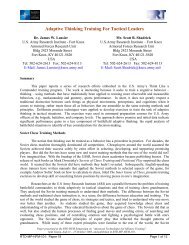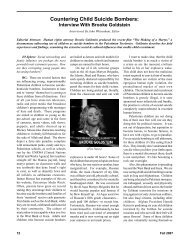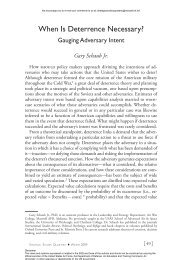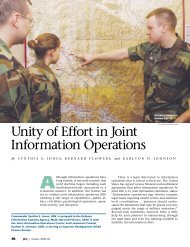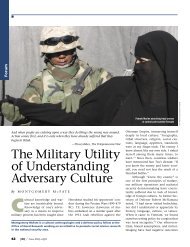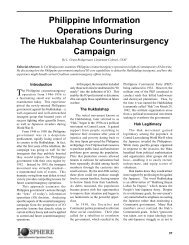Legitimate use of military force against state-sponsored - Air University
Legitimate use of military force against state-sponsored - Air University
Legitimate use of military force against state-sponsored - Air University
Create successful ePaper yourself
Turn your PDF publications into a flip-book with our unique Google optimized e-Paper software.
State Sponsorship<br />
State sponsorship exists when a <strong>state</strong> directly <strong>use</strong>s international terrorism “as another<br />
weapon <strong>of</strong> warfare to gain strategic advantage where they cannot <strong>use</strong> conventional means.” 50<br />
According to the CIA, 1980 was “the first year [since World War II] that a large number <strong>of</strong><br />
deadly terrorist attacks were carried out by national governments. ” 51 State-<strong>sponsored</strong> terrorism,<br />
to turn a phrase <strong>of</strong> Gen Carl von Cla<strong>use</strong>witz, “is a continuation <strong>of</strong> war by other means.” A 1985<br />
Senate report agreed that terrorism “can be another tool for nations to project <strong>military</strong> and<br />
political power. Terrorism [becomes] an instrument that can be brought into action whenever a<br />
<strong>state</strong> wishes to project its power into the territory <strong>of</strong> another without accepting the responsibility,<br />
accountability, and risks <strong>of</strong> avowed belligerency.” 52 States identified by the United States<br />
government as having <strong>sponsored</strong> international terrorism at one time or another include Libya,<br />
Iraq, Syria, and South Yemen. 53<br />
State Support<br />
State support <strong>of</strong> international terrorism exists when a <strong>state</strong> <strong>use</strong>s its resources to provide<br />
assistance in the form <strong>of</strong> training, arms, explosives, equipment, intelligence, safe havens,<br />
communications, travel documents, financing, or other logistic support but does not direct<br />
terrorist incidents. 54 States give support when they provide capability without assuming control<br />
or direction. Current evidence suggests that the Soviet Union and Soviet-bloc countries—<br />
including Bulgaria, Cuba, Czechoslovakia, and East Germany—are actively providing this type<br />
<strong>of</strong> <strong>state</strong> support. 55<br />
State Toleration<br />
State toleration exists when <strong>state</strong>s, although aware <strong>of</strong> terrorist groups within their borders,<br />
do not support them but do not act to suppress them either. Such terrorists groups may be selfsupporting<br />
or may have foreign sponsors or supporters. They may carry out their terrorist<br />
activities primarily abroad having reached an unspoken understanding with the host government.<br />
Allegations that some Western European nations have tolerated international terrorists within<br />
their borders have surfaced from time to time—the Euzkadi ta Azkatasuna (Basque National<br />
Liberty movement) in southwestern France, for example).<br />
State Inaction<br />
In this particular circumstance, the <strong>state</strong> does not wish to ignore international terrorists<br />
within its borders but lacks the ability (either through inadequate domestic police and <strong>military</strong><br />
<strong>force</strong>s or lack <strong>of</strong> technology) to respond effectively. In such a situation, as we shall see in chapter<br />
3, the <strong>state</strong>’s responsibility to deal with these terrorists continues. It may meet this responsibility<br />
by inviting another <strong>state</strong> or regional organization to assist it. The aerial hijacking to Mogadishu<br />
in 1977 is an example. The Somalian government, unable to act, asked for assistance from the<br />
West German government. If a <strong>state</strong> is incapable <strong>of</strong> responding to international terrorism and<br />
does not request outside help, then a situation may arise in which assistance may be given<br />
without an invitation. The Entebbe hostage rescue is sometimes cited as an example, although


